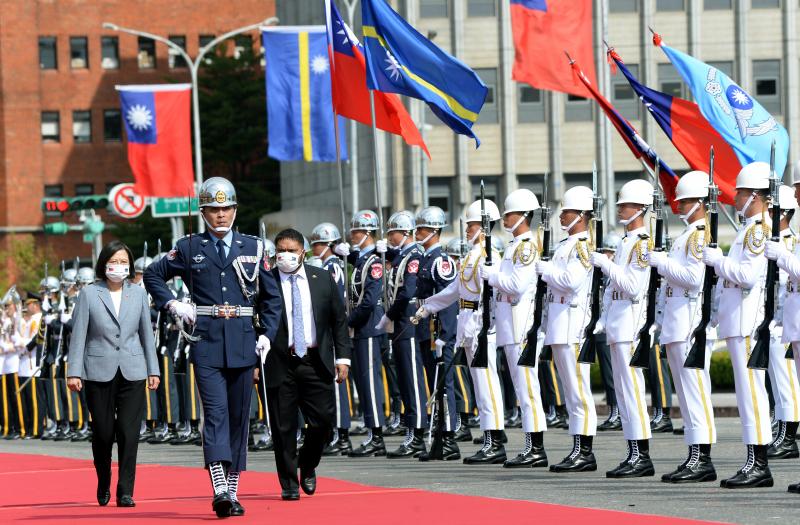Taiwan on Monday terminated diplomatic relations with Nauru, after the Pacific nation announced it was to recognize the People’s Republic of China (PRC), effective immediately.
Nauruan President David Adeang made the announcement in a video posted online on Monday afternoon.
The Nauru government said that "in the best interests" of the country and its people, it was seeking full resumption of diplomatic relations with China.

Photo: Lin Cheng-kun, Taipei Times
"This means that the Republic of Nauru will no longer recognize the Republic of China (Taiwan) as a separate country, but rather as an inalienable part of China's territory, and will sever 'diplomatic relations' with Taiwan as of this day and no longer develop any official relations or official exchanges with Taiwan," it said in a statement.
Nauru established relations with Taiwan in 1980, then switched to recognize the PRC in 2002 before re-establishing relations with Taiwan in 2005.
The decision leaves Taiwan with 12 allies, including other Pacific nations Palau, the Marshall Islands and Tuvalu.
In a news conference called to respond to the decision, the Ministry of Foreign Affairs said it would sever ties, after Nauru made its announcement citing UN Resolution 2758 and the “one China” principle.
Taiwan would also immediately cease all bilateral cooperation, withdraw its staff and technical missions, and requested that Nauru close its embassy in Taiwan, Deputy Minister of Foreign Affairs Tien Chung-kwang (田中光) said.
On X, the ministry said it regrets the end of relations between the two countries.
"This timing is not only China’s retaliation against our democratic elections but also a direct challenge to the international order," it said. "Taiwan stands unbowed & will continue as a force for good."
Additional reporting by CNA and Reuters

CHAOS: Iranians took to the streets playing celebratory music after reports of Khamenei’s death on Saturday, while mourners also gathered in Tehran yesterday Iranian Supreme Leader Ayatollah Ali Khamenei was killed in a major attack on Iran launched by Israel and the US, throwing the future of the Islamic republic into doubt and raising the risk of regional instability. Iranian state television and the state-run IRNA news agency announced the 86-year-old’s death early yesterday. US President Donald Trump said it gave Iranians their “greatest chance” to “take back” their country. The announcements came after a joint US and Israeli aerial bombardment that targeted Iranian military and governmental sites. Trump said the “heavy and pinpoint bombing” would continue through the week or as long

TRUST: The KMT said it respected the US’ timing and considerations, and hoped it would continue to honor its commitments to helping Taiwan bolster its defenses and deterrence US President Donald Trump is delaying a multibillion-dollar arms sale to Taiwan to ensure his visit to Beijing is successful, a New York Times report said. The weapons sales package has stalled in the US Department of State, the report said, citing US officials it did not identify. The White House has told agencies not to push forward ahead of Trump’s meeting with Chinese President Xi Jinping (習近平), it said. The two last month held a phone call to discuss trade and geopolitical flashpoints ahead of the summit. Xi raised the Taiwan issue and urged the US to handle arms sales to

BIG SPENDERS: Foreign investors bought the most Taiwan equities since 2005, signaling confidence that an AI boom would continue to benefit chipmakers Taiwan Semiconductor Manufacturing Co’s (TSMC, 台積電) market capitalization swelled to US$2 trillion for the first time following a 4.25 percent rally in its American depositary receipts (ADR) overnight, putting the world’s biggest contract chipmaker sixth on the list of the world’s biggest companies by market capitalization, just behind Amazon.com Inc. The site CompaniesMarketcap.com ranked TSMC ahead of Saudi Aramco and Meta Platforms Inc. The Taiwanese company’s ADRs on Tuesday surged to US$385.75 on the New York Stock Exchange, as strong demand for artificial intelligence (AI) applications led to chip supply constraints and boost revenue growth to record-breaking levels. Each TSMC ADR represents

Pro-democracy media tycoon Jimmy Lai’s (黎智英) fraud conviction and prison sentence were yesterday overturned by a Hong Kong court, in a surprise legal decision that comes soon after Lai was jailed for 20 years on a separate national security charge. Judges Jeremy Poon (潘兆初), Anthea Pang (彭寶琴) and Derek Pang (彭偉昌) said in the judgement that they allowed the appeal from Lai, and another defendant in the case, to proceed, as a lower court judge had “erred.” “The Court of Appeal gave them leave to appeal against their conviction, allowed their appeals, quashed the convictions and set aside the sentences,” the judges